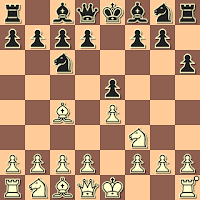If you look at the games of Alonzo Wheeler Jerome, you will see that he consistently played "his" gambit 1.e4 e5 2.Nf3 Nc6 3.Bc4 Bc5 4.Bxf7+.
However, as many tactical minded players have shown (as recent as "Jerome Gambit: Application"), parts of the Jerome Gambit can be applied to other openings to yield wild, attacking play - especially in blitz games.
Guest0679558022 - Guest4717316331
10 0 blitz, Chess.com, 2022
1.e4 e5 2.Nf3 Nc6 3.Bc4 h6
I call this the Semi-Italian Opening, based on Euwe and Meiden's use of the label in their Chess Master vs Chess Amateur (1963).
Others prefer the title Anti-Fried Liver Defense, because it keeps White's Knight off of g5, thereby avoiding the Fried Liver Attack, 1.e4 e5 2.Nf3 Nc6 3.Bc4 Nf6 4.Ng5 d5 5.exd5 Nxd5 6.Nxf7 Kxf7.
4.Bxf7+
This variation does not have a name, but I refer to it as an "impatient Jerome Gambit", as White sacrifices before Black plays ...Bc5. The lack of a hanging Bishop on c5 makes White's subsequent play more like the Halloween Gambit 1.e4 e5 2.Nf3 Nc6 3.Nc3 Nf6 4.Nxe5 Nxe5 5.d4.
For the record, although not as representative as the selection of Jerome Gambit games, The Database has 2,634 games with the position after 4.Bxf7+, with White scoring 42%.
4...Kxf7 5.Nxe5+
Stockfish 14.1 shivers down to its bits and bytes at this move, but its recommendation to transpose to the Scotch Opening with 5.d4 exd4 6.Nxd4 is not to everyone's liking. Again, The Database has 271 games with that line, with White scoring 41%.
5...Nxe5 6.d4 Nc6
White has sacrificed two pieces for two pawns. In return he has a large pawn center, an enemy King to attack - and an opponent who has (most likely) been taken out of his opening preparation. In a slower game, this might not be enough, but in blitz that is often serious compensation.
7.Nc3 Nf6 8.e5 Qe8 9.O-O Nh7
The Knight withdraws to an uncomfortable place. It is interesting that the computer suggests that Black settle things "scientifically" by returning a piece for two pawns, with 9...Nxe5 .
10.Nd5 Qd8 11.Qf3+ Kg8
We see the impact of White's pawn on e5: first, with Black's Knight chased away, his own Knight can come to d5, and second, the Black Knight can not come to f6 to protect against the check.
There is another lurking danger, as well, tied to the defender's misplaced Knight.
12.Qb3
Threatening a discovered check along the a2-g8 diagonal.
12...Ng5
Hoping to give his King some breathing room.
This could be accomplished safer with 12...g6 13.Nxc7+ d5 14.exd6+ Kg7 15.Nxa8 Bxd6 16.Be3 Nf6 when the position would be messy, but with Black's Kight back in his rightful place at f6, the second player likely would have the advantage.
13.Nf6 checkmate
Discovered, double check and mate. Very, very nice.























